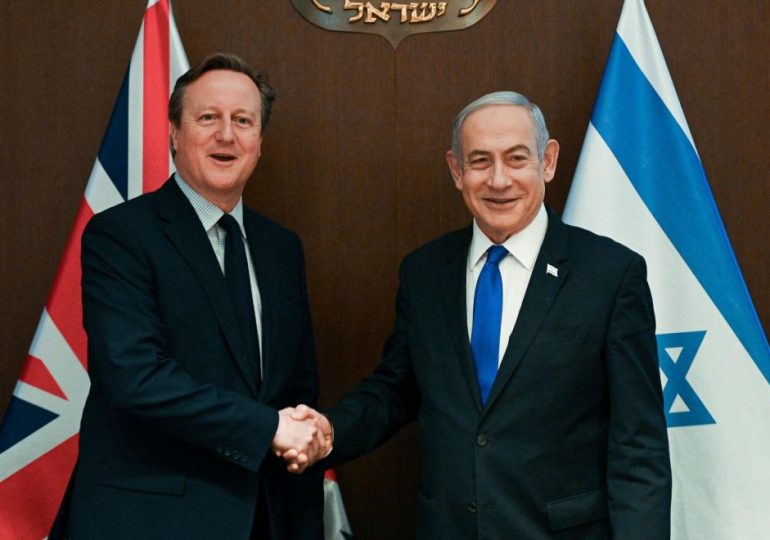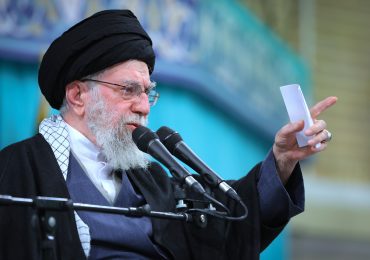BENJAMIN Netanyahu rejected calls from allies to calm Middle East tensions after Iran’s attack by declaring: “We will make our own decisions.”
The Israel prime minister insisted his country would do “whatever is necessary” in retaliation after a meeting with Foreign Secretary Lord Cameron yesterday.
RexBenjamin Netanyahu rejected calls from allies to calm Middle East tensions after a meeting with Foreign Secretary Lord Cameron[/caption]
Iran launched over 350 missiles and drones at Israel last Saturday night
US president Joe Biden speaking with Netanyahu on Sunday over fears of a ‘catastrophic escalation’ in the Middle East
He also saw Germany’s foreign affairs minister Annalena Baerbock.
But he said he would not be swayed by their interventions following Tehran’s drone and missile attack.
He told his Cabinet he had received “all sorts of suggestions and advice”.
But he vowed: “I want to be clear — we will make our decisions ourselves.”
He added ominously: “The state of Israel will do whatever is necessary to defend itself.”
Lord Cameron said Israel was “making the decision to act” after Saturday’s attack which was thwarted with the help of the UK and US.
He added: “We hope they do so in a way that does as little to escalate this as possible and in a way that, as I said yesterday, is smart as well as tough.”
Downing Street had urged Israel to avoid “significant escalation” after PM Rishi Sunak and Mr Netanyahu spoke on the phone on Tuesday.
Lord Cameron hoped today’s G7 meeting in Italy would result in further “co-ordinated sanctions” against Iran.
He said the country needed to be sent “a clear and unequivocal message”.
ReutersIsrael and its allies shot down 99 per cent of the projectiles but Iran has promised to strike back with 10 times the number of Israel retaliates[/caption]
A drone is launched at Israel from an undisclosed location in Iran
How Israel could launch ‘revenge’ strike on Iran
By IONA CLEAVE
ISRAEL’s war cabinet has drawn up plans for a “strategic but painful” revenge attack after Iran’s unprecedented missile and drone blitz – but world leaders fear the outbreak of an “uncontrollable war”.
From a fighter jet blitz on Tehran’s nuclear facilities to strikes on IRGC bases or attacks on its regional terror proxies – The Sun pointed to five major ways Israel may choose to hit back at its enemy.
Last Saturday night, Iran attacked Israel with a wave of hundreds of ballistic and cruise missiles and drones – the first ever direct attack by Tehran on its enemy.
Israel’s Iron Dome defence system and its allies warplanes – including the UK’s RAF Typhoons – shot down 99 per cent of the projectiles.
The aerial attack was a major departure from what has been a long-running shadow war between the two states and sparked the grim possibility of an all-our war across the region.
Israel has vowed a “significant response” in revenge for the 110 ballistic missiles, 36 cruise missiles and 185 attack drones – which Jerusalem saw as a “declaration of war”.
Israeli PM Benjamin Netanyahu called off an immediate retaliation after US President Joe Biden pushed for restraint and warned him to “think carefully” about his next move.
But Israel states it reserves the right to strike Iran “at a manner and time” of its own choosing and told the UN that Iran has “crossed every red line” in its attack.
Jonathan Conicus, senior fellow at the The Foundation for Defense of Democracies and former IDF officer, said this is the “opening act” of Israeli-Iran relations.
He told The Sun: “Iran for the first time stepped out of the convenience and protection of the shadows, and decided to take on Israel directly, and by doing so, of course, Iran presents itself as a target as well.
“How will Israel retaliate? And how will Israel carry a message to the Iranians that they have definitely crossed one bridge too far?”
As the world braces for Israel’s response, UN Secretary General Antonio Guterres told an emergency Security Council meeting on Sunday: “The Middle East is on the brink.
“The people of the region are confronting a real danger of a devastating full-scale conflict. Now is the time to defuse and de-escalate.”
PM Rishi Sunak condemned Iran’s attack as “reckless” and called for calm, while a joint statement from G7 earlier this week also urged caution, fearing a “catastrophic escalation”.
But the question on everyone’s lips is how will Israel choose to respond, could it attack on Iran and what would the scale or intensity be.







